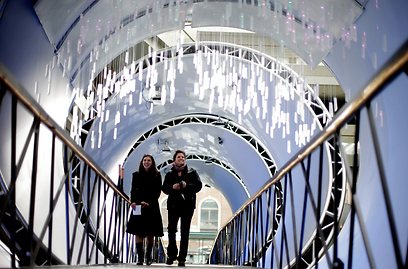The head of Center for Strategic Inventions in Iran claims he’s built a machine that allows man to see his life with 98% accuracy & up to 8 years forward. ‘It will not take you into the future, it will bring the future to you’, he said.
By Ynet
Family and friends of Razeghi were less excited about the machine, claiming that he was “trying to replace God.” Will the next big news of the science world come from Tehran? A young Iranian scientist claims that he has invented a machine that is capable of predicting the future of anyone who touches it. ‘It will not take you into the future, it will bring the future to you,” he said proudly.

Iranian time machine? – Photo: AP
Ali Razeghi, 27, who heads the Centre for Strategic Inventions in Iran, has already listed 179 inventions on his name. Even so, he was especially excited about his latest project – “The Aryayek Time Traveling Machine.”
“I have been working on this for the last 10 years,” he said in the UK newspaper, the Telegraph. According to Razeghi, “The machine can predict five to eight years of the future life of any individual, with 98 percent accuracy.”
So how does the time machine work? Razeghi explains that the machine is based on algorithms, and scans the touch of the user. After it calculates the data, the machine prints a report listing the expected future. The machine is so small, Razeghi added, that it can fit into any laptop case.
The time machine is useful not only for individuals, Razeghi said, but governments too. As he explained, the Iranian government could see outcomes for military confrontations with foreign nations, prepare for fluctuations in the value of foreign currency and changes in the price of oil. “Naturally a government that can see five years into the future would be able to prepare itself for challenges that might destabilise it. As such, we expect to market this invention among states as well as individuals.”
In his defense, Razeghi said, “The project is not anti-religion, and not against our values. The Americans are trying to make this invention by spending millions of dollars on it, where I have already achieved it by a fraction of the cost.”
When it comes to China, Razeghi has set his limit. “The reason that we are not launching our prototype at this stage is that the Chinese will steal the idea and produce it in millions overnight.”
View original Ynet publication at: http://www.ynetnews.com/articles/0,7340,L-4366817,00.html







 Israeli New Shekel Exchange Rate
Israeli New Shekel Exchange Rate